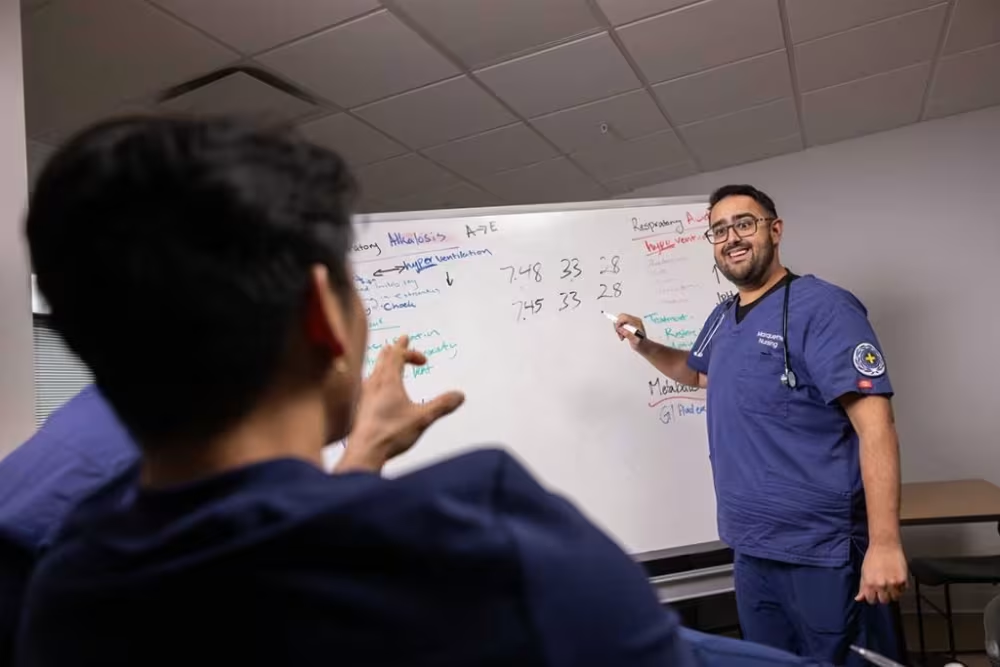What is Nursing School Like?
Each blog post is dated and contains accurate information as of that date. Certain information may have changed since the blog post publication date. If you would like to confirm the current accuracy of blog information, please visit our Direct Entry MSN overview page or contact admissions at (866) 891-8438.
What is nursing school like? While specifics vary depending on the program, you can expect to participate in nursing coursework, on-site skills labs and clinical simulations, and nursing clinicals. The Direct Entry MSN at Marquette prepares students to excel in their nursing careers by providing a foundation in nursing.

If you are considering applying to nursing school, you’re probably wondering, “What is nursing school like?” While some factors remain constant across many nursing programs, your experience will vary depending on the nursing program you are enrolled in.
For example, you could enroll in a four-year Bachelor of Science in Nursing (BSN) program. Or, if you already have a non-nursing bachelor’s degree and want to access a broader range of career opportunities, you’ll have the option of enrolling in an MSN program like Marquette University’s Second Degree Direct Entry Master of Science in Nursing program.
Many programs will be entirely in-person, but Marquette offers the option of in-person or online didactic nursing theory lectures and coursework (depending on which of our locations you enroll in). Whether you are enrolled at our main Milwaukee campus or our Pleasant Prairie, Wisconsin, learning site, you must be located nearby to participate in in-person skills labs, simulations, and clinical rotations.
An MSN degree from Marquette accelerates the path into a nursing career, qualifies you for future certification opportunities, and opens the door to future advanced practice nursing careers. Join us as we highlight what you can expect in a program like ours.
How Does Nursing School Work?
What do you do in nursing school? As a nursing student, you will study nursing fundamentals and core concepts while practicing essential skills you will need throughout your career.
One of the most significant factors that will influence your experience in nursing school will be your program’s curriculum. Marquette University’s Direct Entry MSN program administers a challenging curriculum with the same rigorous standards as a traditional MSN program. It is comprised of three components: in-person or online didactic coursework, skills lab and clinical simulation, and clinical rotations.

In-Person or Online Coursework
When choosing our Direct Entry MSN program, you can select from two separate format options, differentiated by the ability to complete your coursework online or in person. Our main campus in Milwaukee offers a Direct Entry MSN program format with predominantly in-person coursework, whereas our other learning site in Pleasant Prairie provides a program format including predominantly online coursework.
While you will be completing the same courses, in-person and online learning can look very different. How do you choose which one is right for you? Consider your preferred learning style and desired schedule. You should choose in-person learning if you want a more traditional classroom experience and a structured schedule.
If you want a more varied schedule and would learn better from online engaged activities such as asynchronous virtual simulations and synchronous exam reviews with professors, the Pleasant Prairie Direct Entry MSN Learning Site program is your best option.
On-Site Skills Labs, Clinical Simulation and Exams
Whether enrolled at the Milwaukee or Pleasant Prairie location, you will attend your skills lab and clinical simulation in person and exams are proctored in-person and onsite. These labs offer a chance for you to apply what you’ve been learning in a supervised and safe environment.
In our skills labs, you will learn essential nursing skills such as IV insertion, physical assessments, monitoring vital signs, and beyond. During our clinical simulation, you can apply those skills in simulated care scenarios, such as reacting in real-time to a sudden cardiac arrest. The student experience in clinical simulations is based on cutting-edge educational aides like high-tech medical manikins, as well as virtual and mixed-reality scenarios.
Clinical Rotations
When do clinicals start in nursing school? While specifics vary depending on your program, Marquette’s Direct Entry MSN students start clinicals during the second semester.
Your clinical rotations allow you to apply everything you’ve learned. Depending on your program location, you can learn in many of the top healthcare facilities in the Milwaukee metropolitan area, southern Wisconsin, and northern Illinois.
You’ll be supervised by Marquette’s excellent practicing clinicians, specialists in a wide array of practice areas, while administering care to real patients in a real healthcare environment.

While there are no guarantees, it is common for a Marquette student to be offered a position at one of their clinical sites after graduating due to the network and connections they made during rotations. It is always important to put your best foot forward during your time in clinicals to build your professional network and make an excellent first impression.
NCLEX-RN® Prep
Another critical aspect of the nursing school experience at Marquette University is the NCLEX-RN® prep that is present throughout the entirety of the program. The NCLEX-RN® is the exam you will take after you graduate, and passing it means that you can officially become a registered nurse, so it is not to be taken lightly. Because we are invested in your success on this exam at Marquette University, you’ll have plenty of tools and practice available during your time in the program.

A nursing career is within reach if you have a non-nursing bachelor’s degree. Learn how to make the career change to nursing with a second-degree MSN.
How to Balance Life with Nursing School
Nursing school can be demanding for many students; however, there are steps you can take to help you strike a work/life balance. The tips listed below can help you stay on top of coursework and meet challenges while decreasing the risk of nursing student burnout.
Establish a Study Routine
Nursing school coursework may cause you to rethink and prioritize some of your study habits, as it will be very different from your previous educational experiences. It will be imperative that you spend time studying each day, as catching up on material right before an exam won’t be a realistic option.
Treating nursing school as your full-time job is a good rule of thumb. Set up a daily routine to hold yourself accountable for your study time, even if you are completing your coursework online. Also, staying organized and keeping track of assignment deadlines and exam dates will help you stay ahead and give yourself the best chance of success.
Use Student Support Resources
While nursing school can be challenging, you won’t be alone at Marquette University. We offer many resources our students can use throughout their time in the Direct Entry MSN program.
First, your professors will always be willing to help you with questions. As a Marquette student, you will also have access to student support resources including free tutoring and academic coaching. Tutoring focuses on the content you are engaging with throughout your coursework, while academic coaching takes a more holistic look at study skills, time management and test prep.
Because of our small class sizes, you’ll have the chance to connect with your professors personally, and they’ll be willing to work with you one-on-one to help you through any academic topics you might be struggling with. All of our faculty are dedicated to helping you succeed, so reach out if you need help.

Connect with Your Fellow Cohort Members
While you may not have as much free time during nursing school, you still could make lifelong friends in your cohort. You will spend a lot of time together in classes and labs, forming study groups, and experiencing clinicals together. Aside from our classrooms and labs, we offer dedicated student lounges as resources to gather, study and connect.
Your classmates can be great resources when you need help understanding a topic or need to talk to someone who understands what it’s like to be a nursing student. Leaning on your cohort during stressful times can help uplift you to meet challenges and is integral to striking a work/life balance.
Learn how to cope with nursing school stress with these seven tips.

What are the Common Nursing School Misconceptions?
With the direct entry MSN format, there are some common misconceptions about the student experience during the program — from a high level of intensity to the way that the curriculum focuses on the nursing model, clinical judgment, and critical thinking. Learning more about these aspects and how to prepare for them can help you succeed as a student.
Level of Intensity
One of the misconceptions about what to expect in nursing school is that it will not be more difficult than other educational experiences. Even students who recognize that it will be challenging are sometimes surprised at the level of intensity, especially in their first term. While it can be a big adjustment, plenty of resources are available to you as a Marquette University student, including tutoring, faculty support, top-notch facilities, and coordination among your cohort.
Because students can misjudge the program's intensity, some assume that they will easily be able to work a full-time job while pursuing an MSN degree in a direct-entry format. We highly recommend not working more than is financially necessary during your time in the program, as you must dedicate a significant amount of time to your schoolwork.
Focus on the Nursing Model, Clinical Judgement and Critical Thinking
Another common misconception is that many students initially begin the program thinking that most of their time will be spent learning hands-on nursing skills. While this is undoubtedly an important topic that is covered, much of your learning goes far beyond hands-on nursing skills. Marquette focuses on teaching students how to think like a nurse, assess patients, and identify small changes in patient status.

In-depth information on pathophysiology, pharmacology, and physical assessments, and the connection between these, is the key element of your education through the program. Marquette University nurses will graduate with the values of caring for the whole person, courageous leadership, engaged critical thinking, becoming a champion of social justice, and advocating for the vulnerable.
Ready To Get Started?
Now that you can answer the question, “What is nursing school like?”, it’s time to set yourself up for success. If you are interested in Marquette University’s Direct Entry MSN program, which can be completed in five to eight semesters, contact our admissions advisers today for more information. They are available to answer any questions you may have about our program so that you can take the first step toward your dream career as a nurse.
